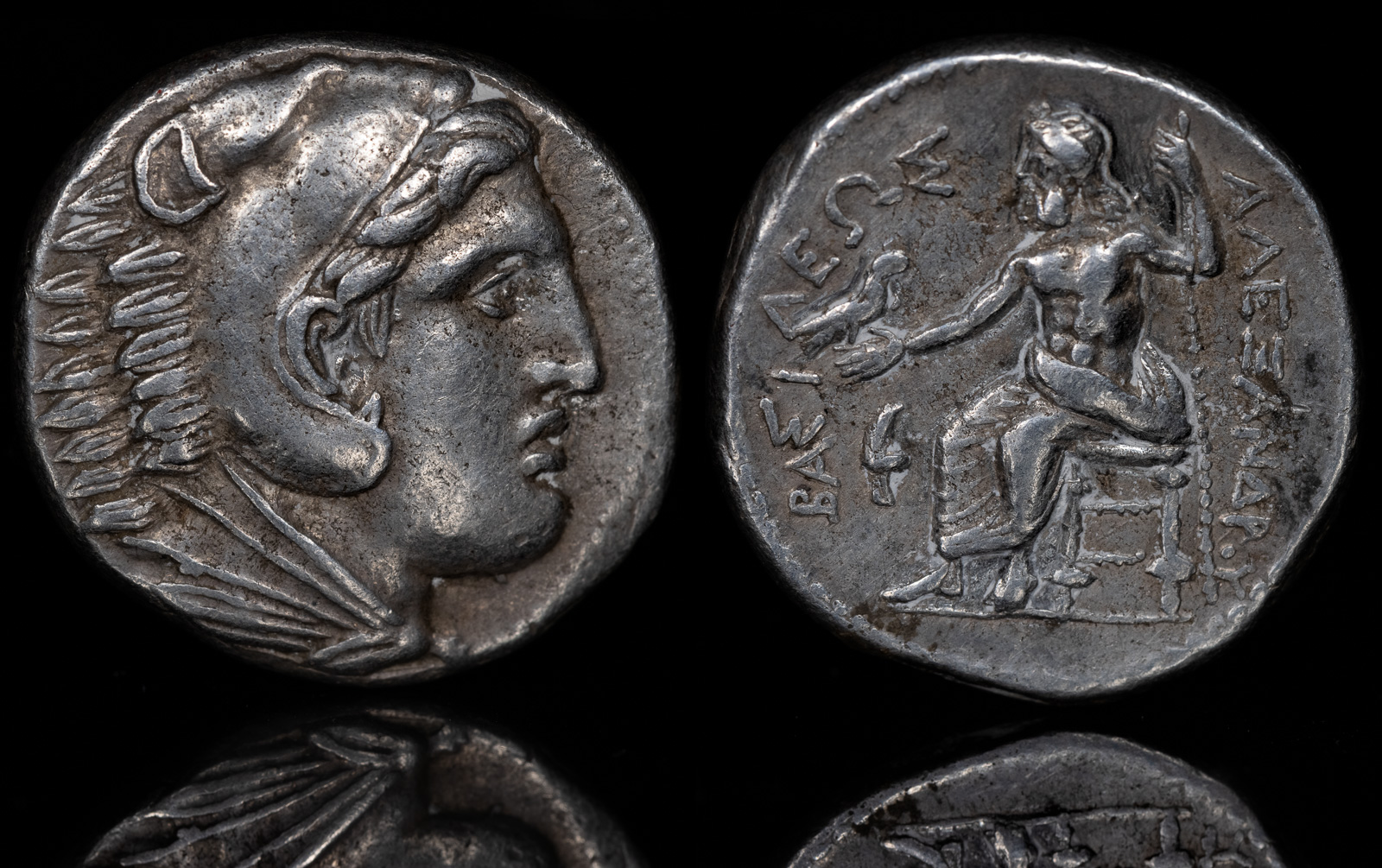
Kingdom of Macedon, Philip III Arrhidaios AR Tetradrachm
In the name and types of Alexander III.
Amphipolis, circa 323-317 BCE
Head of Herakles to right, wearing lion skin headdress / Zeus Aëtophoros seated to left, holding eagle and sceptre; Phrygian cap before, BAΣIΛEΩΣ to left, ΑΛΕΞΑΝΔΡΟΥ to right. Price 112; Troxell, Studies, Issue H2, 61; Müller 854. 17.06g, 26mm, 3h.
Ex Gorny & Mosch Giessener Münzhandlung
It’s notable that, despite all the history we know about Alexander the Great‘s son, we don’t have a single transcription of anything he said.
For all his life, Alexander IV was a pawn. Even before he was born, there was debate over who would be crowned the king of Alexander the Great’s empire – the yet unborn Alexander IV, who Roxane promised was male but they didn’t really know – or Philip III Arrhidaeus, who was mentally incapacitated.
In the end, after a few deaths over the matter, they were chosen as co-emperors. Nevertheless, neither had any real power. Philip III was dominated by his wife, Eurydike. Alexander IV was never given any decisions, and spent the majority of time with his mother, Roxane.
Most of his life was spent being ferried from one place to the next, as various kings used his presence to their advantage. This ended after the particularly brutal siege of Pydna by Kassander, during which Alexander IV and his mother survived on near nothing along with Alexander’s mother Olympias.
After the siege ended, Kassander ordered Olympias stoned by those whose relatives she had murdered, then he left her body to the crows. Alexander IV was stripped of his royal privileges and whisked away to a remote location where, along with his mother, he was killed around the age of fourteen.
At that time, Seleukos, Ptolemy, Kassander, Lysimachos, and Antigonos had all considered themselves kings. An at-age Alexander IV was therefore a tremendous threat to each of them, and so none were concerned when Kassander gave the order. Nevertheless, Alexander’s death was kept secret for several years, and when it was finally publicized each of the Diadochi formally declared themselves kings.
June
Alexander IV and Philip III are chosen in Babylon as co-sovereigns.
December
Alexander IV is born to Roxana in Babylon.
Partition of Triparadisos. Abydos is given to Arrhidaios. Susa goes to Antigenes. Antipater is left in charge of Macedonia and is entrusted with Alexander IV and Philip III. Asandros is confirmed with Caria. Kleitos the White receives Lydia, replacing Menander. Laomedon is confirmed as satrap of Koele-Syria. Peithon is confirmed in Kophen. Seleukos receives Babylon.
Antipater brings Roxana, Alexander IV, and Philip III with Adea Eurydike to Macedon.
March
Kassander completes the siege of Pydna and executes Olympias. Alexander IV and Roxana are imprisoned in Amphipolis.
The peace treaty for the Third Diadoch War, agreed to by Ptolemy, Kassander, Lysimachos, and Antigonos, recognizes the rights of Alexander IV and states he will succeed Kassander in Macedon when he is of age. Antigonos Monophthalmos is now free to take on Seleukos I Nikator directly.
Kassander orders Alexander IV and Roxana to be executed. They are both poisoned.